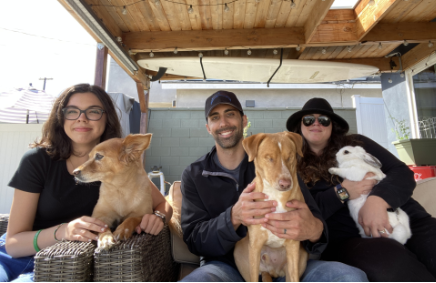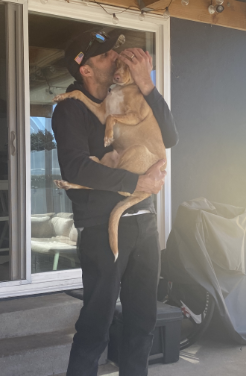Love without sight: A Marine with RP has a new best friend
July 9, 2021
Louis the rescue dog, AKA Murphy, was ready for his close-up when People® magazine arrived with their cameras. The dog had been blinded by his previous owners, and animal lovers across the nation were all clamoring to adopt the newly orphaned mutt. However, within a day of receiving a letter from 17-year-old Jordan Walker, the Helen Woodward Animal Center in San Diego knew they’d probably found the perfect home for their four-legged celebrity.

Love of animals is definitely a family value for this Southern California family. (From L-R) The Walker’s current pack includes Jordan, Palousa, Steve, Murphy, Kacey and Honey Bunny.
Kacey and Steve Walker wove in and out of Southern California traffic as they made their way south from their home in Redondo Beach. Kacey smiled as she looked over at Steve. They had been through so much together since first meeting 20 years ago as teens in Junior ROTC. And now this. She was nervous, but something felt so right about it all.
Their teenage daughter was in the back seat of the car anxiously peppering her parents about their chances of being selected as the new owners of Louis the dog. All three Walkers were eager to meet the sweet little guy they’d read about in People® Magazine. So were hundreds of other people across the country. Steve felt Kacey squeeze his hand. Was it in solidarity? Hope? Nerves? He couldn’t know, of course, because like the dog they were going to see at the Helen Woodward Animal Center in San Diego, Steve was also blind.
When I heard there was another family in the running, my immediate reaction was, ‘It’s okay. I know what it feels like to want something and not get it.’
Steve wasn’t blind in high school when he and Kacey first met. The two were good friends in school but then Steve, a year older, graduated and joined the Marine Corp. They lost touch with each other. After Steve finished boot camp at Camp Pendleton, the young recruit began to notice issues with his vision. During the day, he was a high performer, able to manage the training and exercises; but at night, things were very different. “All of my instincts would go down,” said Steve. “It wasn’t a matter of physical fitness, but everything would just plummet in terms of my speed, agility, and confidence.” He chalked it up to having worn glasses his whole life. Or maybe, he thought, he just didn’t like the dark.
Eventually, Steve’s declining night vision drove him to see an optometrist, who said he suspected Steve had a serious inherited retinal disease (IRD) called retinitis pigmentosa (RP). If that were the case, the optometrist added, Steve wouldn’t be a marine for much longer. “It’s not that I didn’t believe him,” Steve said. “It was just all so much to handle in less than 60 seconds.” After an ophthalmologist and a series of tests confirmed the diagnosis, the military began paperwork for a medical discharge. Steve, however, had other plans and filed an appeal to stay in the Corp. The appeal was granted, and Steve was given an administrator job, spending most of his time behind a desk and a computer.

A man and his dog. Steve gives Murphy a little love, helping the dog with no vision feel welcome at his new home.
Meanwhile, it was the fall of 2001, and the country was about to experience the unthinkable. Kacey was a senior in high school. She couldn’t have imagined how her life was going to change that fall. “September 11th happened, and Steve was in the Marine Corps,” Kacey said. “It was this kind of catalyst. You reached out to everybody you cared about in those moments.” She reconnected with Steve and, in her words, the two “have been inseparable since.” They married not long after Kacey’s graduation.
In the early years following Steve’s diagnosis, his symptoms were relatively mild, and the couple felt as if they were coping successfully. Steve finished his military commitment and began working as a mortgage broker. The two had a sweet little girl named Jordan. Looking back, they now believe their young age shielded them from understanding just how thoroughly RP would eventually impact their lives. Reality started swinging in 2008. That’s when the mortgage industry imploded, Steve lost more of his sight, and he had to give up driving. “When he stopped driving, he quit his job and went back to college,” Kacey remembered. “He was hit with so many identity changes all at once that he was shutting down.”
Desperate to help her husband find his footing and regain his sense of self, Kacey suggested he revisit an old dream he’d deprioritized—the Ironman Triathlon. “Not to be rude,” Steve said, “but I thought it was a stupid idea. I’m like, ‘Why are you bringing this up now that I can’t see? This is silly.’” Eight years and 10 triathlons later— including two full Ironman competitions—the idea doesn’t sound so silly. Now a competitive athlete, Steve is involved with the United States Association of Blind Athletes (USABA), as well as the Challenged Athletes Foundation (CAB) and its program for disabled veterans, Operation Rebound.
Steve’s network of friends and fellow athletes has grown, creating a rich and rewarding life for the Walkers. In fact, it was a fellow blind athlete who encouraged Steve to pursue genetic testing to identify the mutation responsible for his IRD, a step the Marine hadn’t considered before. “He said to me, ‘You should get it done so you know exactly which genetic mutation you have,’” Steve recalled. “‘That way, when there are clinical trials, you’ll know if you’re a candidate.’”
Steve didn’t hesitate. Not only was he able to identify the mutation responsible for his RP, but he also shared the information with his siblings so they could make informed family planning decisions. “We told my sisters, ‘If you’re going to have another baby, maybe you should check it out.’” The sister who did pursue testing found peace of mind when the results confirmed she wasn’t a carrier for RP.
Looking out for others seems to be a part of the Walker family’s make-up. Maybe that’s why, after reading the plight of a little dog blinded by his previous owners and in need of a new home, Steve, Kacey and Jordan couldn’t shake the feeling that they were Louis the dog’s people. In a letter Jordan wrote to the animal shelter, she made such a good case for why they were the right family for Louis that they made the final cut. In the end, it came down to two families being considered. “When I heard there was another family in the running, my immediate reaction was, ‘It’s okay. I know what it feels like to want something and not get it,’” she said. Kacey felt deep down, however, that at the end of the day, the other family didn’t stand a chance.
She was right. Out of thousands of applications from people all around the world, Louis, now known as Murphy, found his forever home with Steve, Kacey and Jordan Walker. The speed of the adoption was actually a little mind boggling. Jordan wrote her letter to the animal shelter on Tuesday; the shelter called on Wednesday; the Walkers drove to San Diego on Thursday for a meet and greet; and, by Friday, Murphy was happily napping in his new home with the Walkers, their bulldog Dragon (R.I.P., good boy) and Honey the Bunny. “I think Murphy was just always meant to be ours,” Kacey said.
Life with retinitis pigmentosa is certainly full of loss and challenge. However, Steve and Kacey are quick to point out that some of their most prized experiences are a direct result of Steve’s vision loss: athletic accomplishments that made Steve whole; a vibrant network of friends; a very real understanding of what is important in this life; and, of course, Murphy the blind dog.
Semper Fi, Murph.
